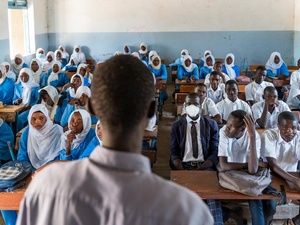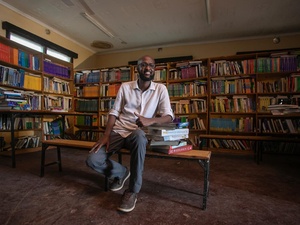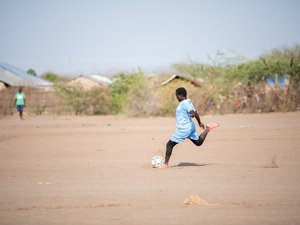Fostering inclusion of refugees in national education systems and beyond
Fostering inclusion of refugees in national education systems and beyond

Hazratollah, an Afghan student attending school in Esfahan, Iran
Hazratollah beams with pride talking about his school.
The 12-year-old Afghan refugee studies hard and loves learning, earning his teacher’s and principal’s praise. He has made fast friends with all his classmates since starting school in Iran.
For over 40 years, Iran has provided refuge to Afghans fleeing violence, insecurity, and deprivation in Afghanistan. As a result of the Government of the Islamic Republic of Iran’s education policy, refugee children can access education despite their documentation situation. This policy, one of the most progressive in the world, gives hundreds of thousands of refugee children equal access to the national education system as their Iranian peers.
Hazratollah recalls the excitement of his first day of school after his family fled Afghanistan in 2021 amid political turmoil. The school enrollment process can be challenging for foreign nationals in an unfamiliar country. Hazratollah’s father was at odds when trying to navigate a new system.
Fortunately, Iranian friends and officials of the Bureau for Aliens and Foreign Immigrants Affairs (BAFIA) helped the family in securing the necessary documents. Still, Hazratollah impatiently asked to attend classes at a neighborhood school as he awaited approval.
"I would love to become an engineer"
Iran hosts nearly 3.4 million Afghan refugees, one of the largest refugee hosting countries in the world. Iranian schools admit all foreign national students, including refugees, enabling them to access education alongside Iranian children.
UNHCR, the UN Refugee Agency, supports Iran’s inclusive education policy mainly with the construction and equipment of schools. Without more international backing of the country’s decades-long hospitality, refugees may face increasing barriers to access services, including adequate support to have an education.
“We study at home a lot, but it is better if we go to school,” said Hazratollah. “I would love to become an engineer. It is a beautiful job, better than being a construction worker,” he continues, reflecting on the many times he saw his father crafting metal at his workplace.
A passion for learning drives Hazratollah to excel at school. But global solidarity is critical to making refugee children’s wishes come true. Iran relies on more nations to contribute to enhancing young refugees like Hazratollah to fulfill their dreams.
This article was originally published on the UNHCR Iran website.









